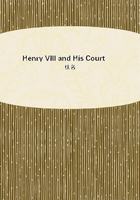
第4章 THE QUEEN AND HER FRIEND(1)
At last this long day of ceremonies and festivities drew near its close, and Catharine might soon hope to be, for the time, relieved from this endless presenting and smiling, from this ever-renewed homage.
At her husband's side she had shown herself on the balcony to receive the greetings of the people, and to bow her thanks. Then in the spacious audience-chamber her newly appointed court had passed before her in formal procession, and she had exchanged a few meaningless, friendly words with each of these lords and ladies.
Afterward she had, at her husband's side, given audience to the deputations from the city and from Parliament. But it was only with a secret shudder that she had received from their lips the same congratulations and praises with which the authorities had already greeted five other wives of the king.
Still she had been able to smile and seem happy, for she well knew that the king's eye was never off of her, and that all these lords and ladies who now met her with such deference, and with homage apparently so sincere, were yet, in truth, all her bitter enemies.
For by her marriage she had destroyed so many hopes, she had pushed aside so many who believed themselves better fitted to assume the lofty position of queen! She knew that these victims of disappointment would never forgive her this; that she, who was but yesterday their equal, had to-day soared above them as queen and mistress; she knew that all these were watching with spying eyes her every word and action, in order, it might be, to forge therefrom an accusation or a death-warrant.
But nevertheless she smiled! She smiled, though she felt that the choler of the king, so easily kindled and so cruelly vindictive, ever swung over her head like the sword of Damocles.
She smiled, so that this sword might not fall upon her.
At length all these presentations, this homage and rejoicing were well over, and they came to the more agreeable and satisfactory part of the feast.
They went to dinner. That was Catharine's first moment of respite, of rest. For when Henry the Eighth seated himself at table, he was no longer the haughty monarch and the jealous husband, but merely the proficient artiste and the impassioned gourmand; and whether the pastry was well seasoned, and the pheasant of good flavor, was for him then a far more important question than any concerning the weal of his people, and the prosperity of his kingdom.
But after dinner came another respite, a new enjoyment, and this time a more real one, which indeed for a while banished all gloomy forebodings and melancholy fears from Catharine's heart, and suffused her countenance with the rosy radiance of cheerfulness and happy smiles. For King Henry had prepared for his young wife a peculiar and altogether novel surprise. He had caused to be erected in the palace of Whitehall a stage, whereon was represented, by the nobles of the court, a comedy from Plautus. Heretofore there had been no other theatrical exhibitions than those which the people performed on the high festivals of the church, the morality and the mystery plays. King Henry the Eighth was the first who had a stage erected for worldly amusement likewise, and caused to be represented on it subjects other than mere dramatized church history. As he freed the church from its spiritual head, the pope, so he wished to free the stage from the church, and to behold upon it other more lively spectacles than the roasting of saints and the massacre of inspired nuns.
And why, too, represent such mock tragedies on the stage, when the king was daily performing them in reality? The burning of Christian martyrs and inspired virgins was, under the reign of the Christian king Henry, such a usual and every-day occurrence, that it could afford a piquant entertainment neither to the court nor to himself.
But the representation of a Roman comedy, that, however, was a new and piquant pleasure, a surprise for the young queen. He had the "Curculio" played before his wife, and if Catharine indeed could listen to the licentious and shameless jests of the popular Roman poet only with bashful blushes, Henry was so much the more delighted by it, and accompanied the obscenest allusions and the most indecent jests with his uproarious laughter and loud shouts of applause.
At length this festivity was also over with, and Catharine was now permitted to retire with her attendants to her private apartments.
With a pleasant smile, she dismissed her cavaliers, and bade her women and her second maid of honor, Anna Askew, go into her boudoir and await her call. Then she gave her arm to her friend Lady Jane Douglas, and with her entered her cabinet.
At last she was alone, at last unwatched. The smile disappeared from her face, and an expression of deep sadness was stamped upon her features.
"Jane," said she, "pray thee shut the doors and draw the window curtains, so that nobody can see me, nobody hear me, no one except yourself, my friend, the companion of my happy childhood. Oh, my God, my God, why was I so foolish as to leave my father's quiet, lonely castle and go out into the world, which is so full of terror and horror?"She sighed and groaned deeply; and burying her face in her hands, she sank upon the ottoman, weeping and trembling.
Lady Jane observed her with a peculiar smile of malicious satisfaction.
"She is queen and she weeps," said she to herself. "My God, how can a woman possibly feel unhappy, and she a queen?"She approached Catharine, and, seating herself on the tabouret at her feet, she impressed a fervent kiss on the queen's drooping hand.